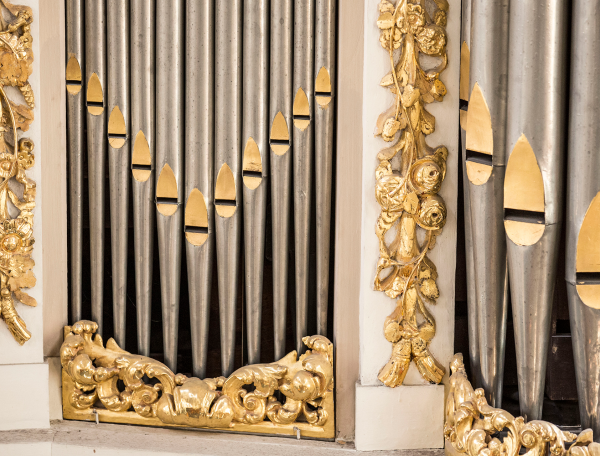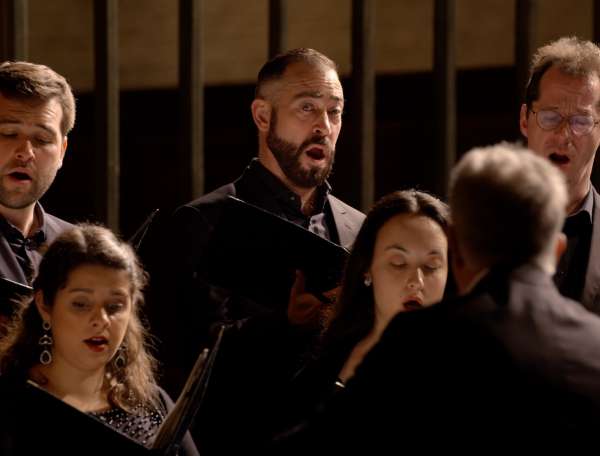

Meine Seel erhebt den Herren
BWV 10 performed by the Netherlands Bach Society
conducted by Marcus Creed
Grote Kerk, Naarden
Behind the music
Exuberant cheerfulness
You hear the baby jumping for joy in Elizabeth’s belly
Meine Seel erhebt den Herren was written by Bach for the Feast of Visitation of Mary on 2 July 1724 in Leipzig. The church reading for that day was the passage from the Gospel of Luke that describes the expectant Mary’s visit to her cousin Elizabeth, who is also expecting. When the two women greet one another, Elizabeth’s baby (who grew up to be John the Baptist) jumps for joy in her belly, as he recognises Jesus in Mary’s belly. Then Mary bursts into what is known as Mary’s hymn of praise, or the Magnificat.
Following a short instrumental introduction, the chorus enters in a joyful chorale. The long lines in the orchestra contrast with the quick, lively parts for the choir, creating an effect of exuberant cheerfulness and energy – also later on, when the roles are reversed. The joyful mood continues in the jumpy, dancy soprano aria. The many leaps automatically suggest the baby’s jumps for joy in Elizabeth’s belly. The quick descending lines in the accompaniment of the virtuoso bass aria (Gewaltig stöβt Gott vom Stuhl) illustrate the words exceptionally well. You hear how God casts down the mighty from their thrones into the Schwefelpfuhl (sulphur pit). The recitative by the tenor (Was Gott den Vätern) and the closing chorus bring peace and contemplation.
With support from
Stichting Zabawas
Extra videos
Vocal texts
Original
1. Chor
Meine Seel erhebt den Herrn,
und mein Geist freuet sich Gottes,
meines Heilandes;
Denn er hat seine elende Magd
angesehen. Siehe, von nun an werden
mich selig preisen alle Kindeskind.
2. Arie (Sopran)
Herr, der du stark und mächtig bist,
Gott, dessen Name heilig ist,
wie wunderbar sind deine Werke!
Du siehest mich Elenden an,
du hast an mir so viel getan,
daß ich nicht alles zähl und merke.
3. Rezitativ (Tenor)
Des Höchsten Güt und Treu
wird alle Morgen neu
und währet immer für und für
bei denen, die allhier
auf seine Hülfe schaun
und ihm in wahrer Furcht vertraun.
Hingegen übt er auch Gewalt
mit seinem Arm
an denen, welche weder kalt
noch warm
im Glauben und im Lieben sein;
die nacket, bloß und blind,
die voller Stolz und Hoffart sind,
will seine Hand wie Spreu zerstreun.
4. Arie (Bass)
Gewaltige stößt Gott vom Stuhl
hinunter in den Schwefelpfuhl;
die Niedern pflegt Gott zu erhöhen,
daß sie wie Stern am Himmel stehen.
Die Reichen läßt Gott bloß und leer,
die Hungrigen füllt er mit Gaben,
daß sie auf seinem Gnadenmeer
stets Reichtum und die Fülle haben.
5. Duett (Alt, Tenor)
Er denket der Barmherzigkeit
und hilft seinem Diener Israel auf.
6. Rezitativ (Tenor)
Was Gott den Vätern alter Zeiten
geredet und verheißen hat,
erfüllt er auch im Werk und in der Tat.
Was Gott dem Abraham,
als er zu ihm in seine Hütten kam,
versprochen und geschworen,
ist, da die Zeit erfüllet war, geschehen:
Sein Same mußte sich so sehr
wie Sand am Meer
und Stern am Firmament ausbreiten,
der Heiland ward geboren,
das ewge Wort ließ sich
im Fleische sehen,
das menschliche Geschlecht von Tod
und allem Bösen
und von des Satans Sklaverei
aus lauter Liebe zu erlösen;
drum bleibts darbei, daß Gottes Wort
voll Gnad und Wahrheit sei.
7. Choral
Lob und Preis sei Gott
dem Vater und dem Sohn Und dem
Heiligen Geiste, Wie es war im Anfang,
itzt und immerdar Und von
Ewigkeit zu Ewigkeit. Amen
Translation
1. Chorus
My soul doth magnify the Lord,
and my spirit hath rejoiced in God
my Saviour.
For He hath regarded the low estate
of His handmaiden: for behold, from
henceforth all generations shall call me blessed.
2. Aria (Soprano)
Lord, who art strong and mighty,
God, whose name is holy,
how wonderful are Thy works!
Thou lookest on me, a poor wretch,
thou hast done so much for me,
that I can neither count nor note it all.
3. Recitative (Tenor)
The Almighty’s goodness and faithfulness
are new every morning
and endure forever
among those, who here on earth
look to Him for help
and trust Him with true fear.
But He wields great strength
with His arm
against those who are neither cold
nor hot
in faith and love;
those who are naked, destitute and blind,
and full of pride and arrogance,
will be scattered by His hand like chaff.
4. Aria (bas)
God casts the mighty from His seat
down into the sulphurous pit;
God is wont to exalt the humble and meek,
so that they shine like stars in heaven.
God leaves the rich both empty and destitute,
but the hungry He showers with gifts,
that they upon His sea of grace
have wealth and abundance ever more.
5. Duet (Alto, Tenor)
He hath holpen His servant Israel,
in remembrance of His mercy.
6. Recitative (Tenor)
That which God has spoken and promised
to the ancient fathers
is fulfilled in His works and deeds.
That which God
promised and swore to Abraham,
when He came to him in his tent,
was accomplished in its season.
His seed had to be strewn so far abroad
like sand by the sea
and stars in the firmament;
the Saviour was born,
the eternal Word
was made flesh,
that the human race might be redeemed
from death and all evil
and Satan’s bondage,
through purest love;
thus it remains
that God’s Word is full of grace and truth.
7. Chorale
Laud and praise to God,
the Father, the Son and the Holy Ghost;
as it was in the beginning,
is now and ever shall be,
world without end. Amen.
Credits
-
- Release date
- 23 December 2021
-
- Recording date
- 13 December 2018
-
- Location
- Grote Kerk, Naarden
-
- Conductor
- Marcus Creed
-
- Soprano
- Griet De Geyter
-
- Alto
- Alex Potter
-
- Tenor
- Guy Cutting
-
- Bass
- Matthias Winckhler
-
- Ripieno soprano
- Hilde Van Ruymbeke, Lauren Armishaw
-
- Ripieno alto
- Carla Nahadi Babelegoto, Barnabás Hegyi
-
- Ripieno tenor
- Immo Schröder, Hitoshi Tamada
-
- Ripieno bass
- Matthew Baker, Joep van Geffen
-
- Violin 1
- Shunske Sato, Annelies van der Vegt, Sayuri Yamagata
-
- Violin 2
- Anneke van Haaften, Paulien Kostense, Pieter Affourtit
-
- Viola
- Staas Swierstra, Deirdre Dowling
-
- Cello
- Lucia Swarts, Anne-Linde Visser
-
- Double bass
- Robert Franenberg
-
- Oboe
- Emma Black, Rodrigo Lopez Paz
-
- Bassoon
- Benny Aghassi
-
- Trumpet
- Robert Vanryne
-
- Organ
- Siebe Henstra
-
- Director and editor
- Bas Wielenga
-
- Music recording
- Guido Tichelman, Bastiaan Kuijt, Pim van der Lee
-
- Music edit and mix
- Guido Tichelman
-
- Camera
- Jochem Timmerman, Martin Struijf, Wesley Schipper, Bjorn Tiebout
-
- Lights
- Zen Bloot, Patrick Galvin
-
- Assistant director
- Marieke Donker Kaat
-
- Set technique
- Justin Mutsaers
-
- Data handling
- Jesper Blok
-
- Project manager team
- Ron Vermeulen
-
- Producer concert
- Imke Deters
-
- Producer film
- Jessie Verbrugh
-
- With support from
- Stichting Zabawas

